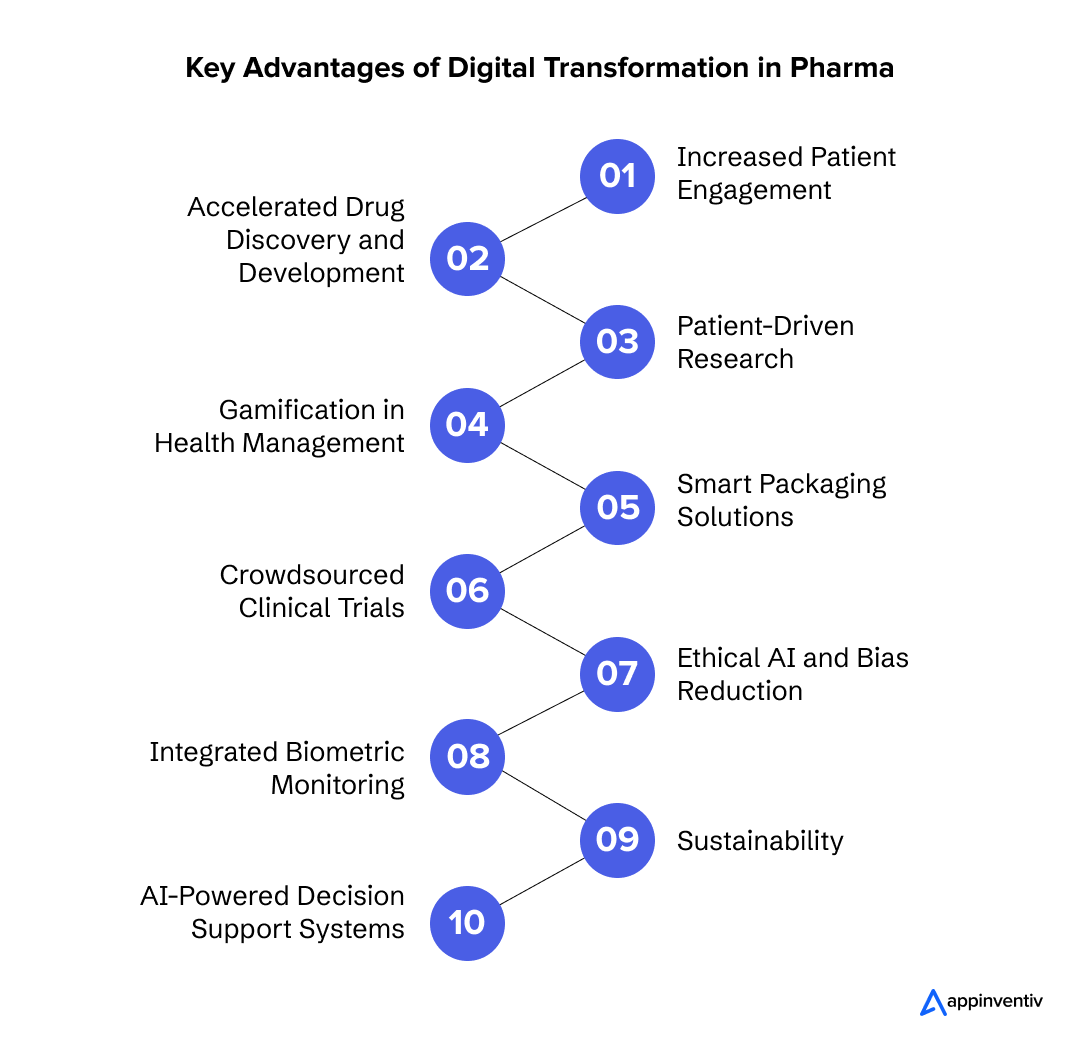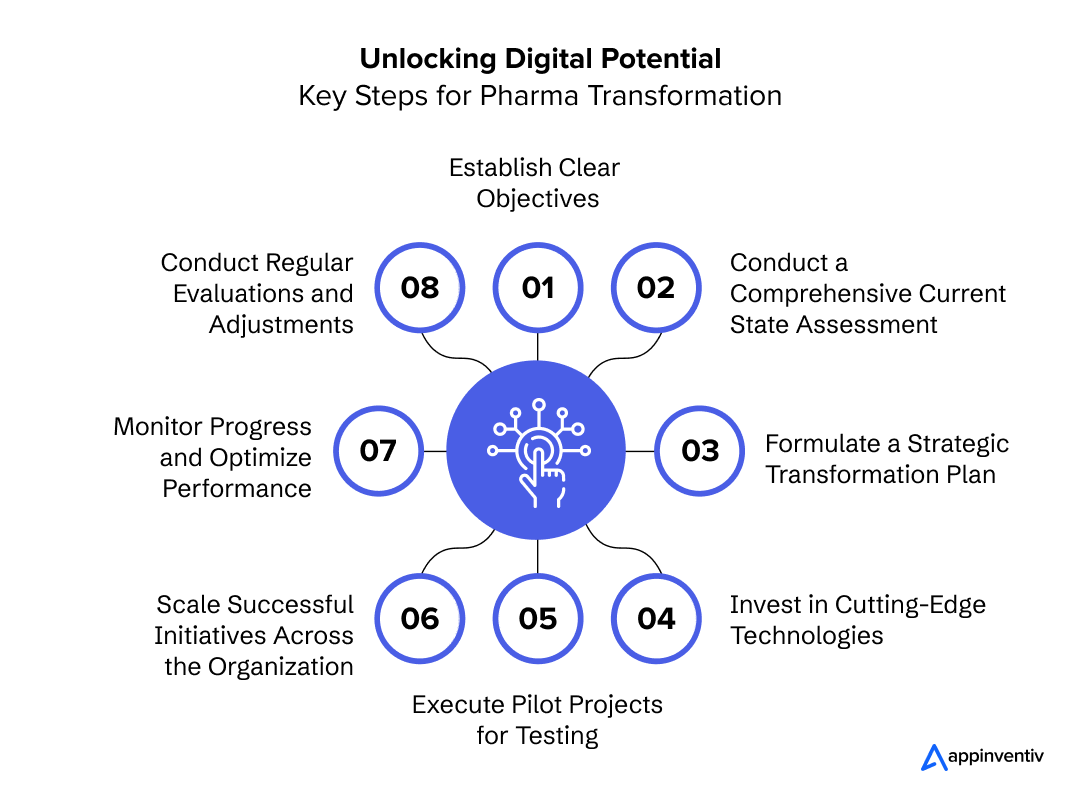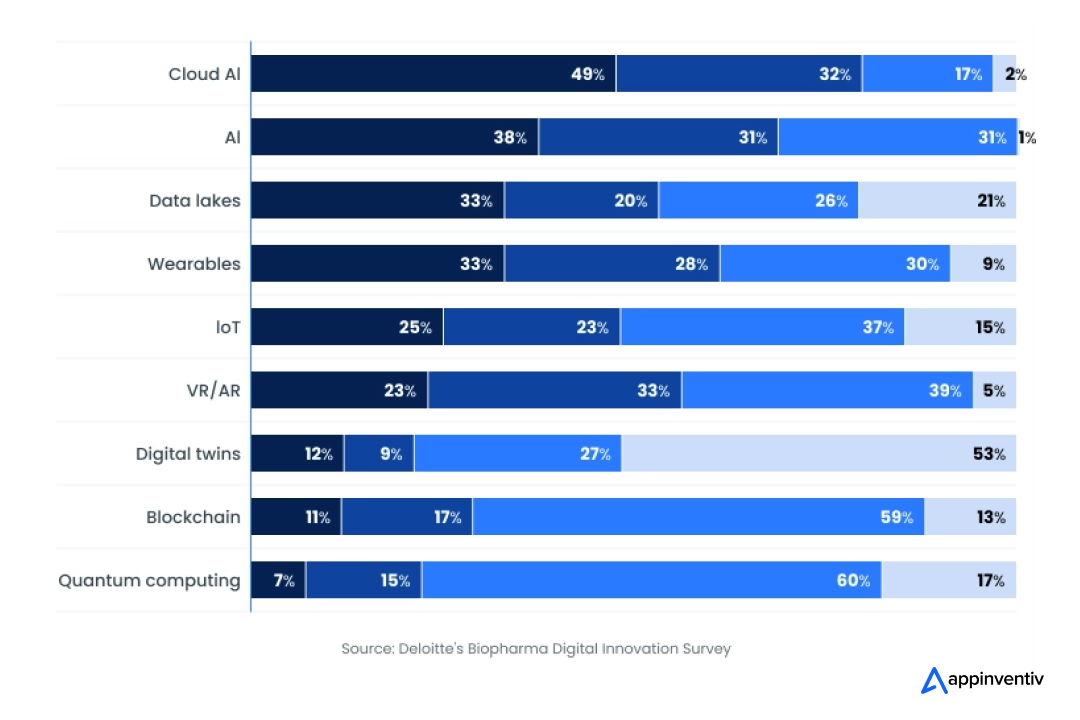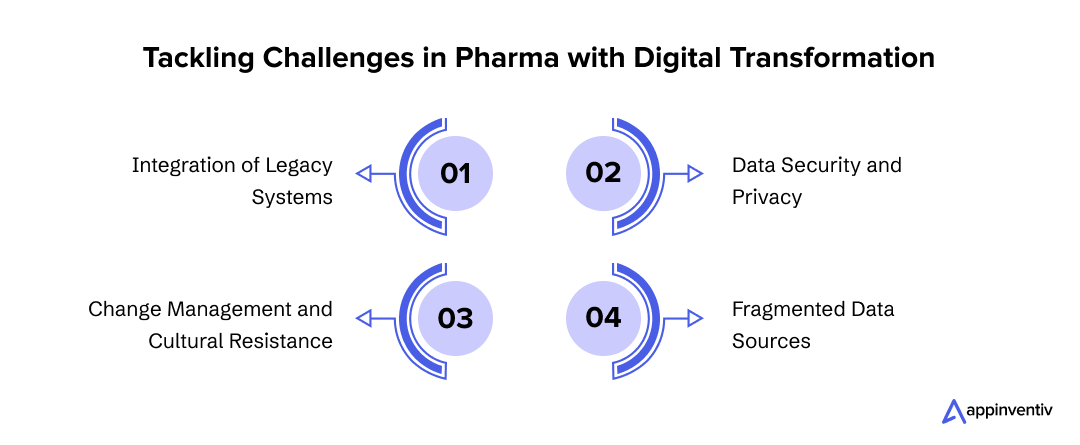- Role of Digital Transformation in the Pharma Industry
- Benefits of Digital Transformation in Pharma
- Increased Patient Engagement
- Accelerated Drug Discovery and Development
- Patient-Driven Research
- Gamification in Health Management
- Smart Packaging Solutions
- Crowdsourced Clinical Trials
- Ethical AI and Bias Reduction
- Integrated Biometric Monitoring
- Sustainability
- AI-Powered Decision Support Systems
- Steps to Implement Digital Transformation in Pharmaceutical Industry
- Establish Clear Objectives
- Conduct a Comprehensive Current State Assessment
- Formulate a Strategic Transformation Plan
- Invest in Cutting-Edge Technologies
- Execute Pilot Projects for Testing
- Scale Successful Initiatives Across the Organization
- Monitor Progress and Optimize Performance
- Conduct Regular Evaluations and Adjustments
- Key Use Cases of Digital Transformation in Pharma
- Pfizer’s Vaccine Development Through AI
- Novo Nordisk’s Utilization of AR in Drug Manufacturing
- AstraZeneca’s AI-Driven Management of Cardiovascular Trials
- GSK’s Manufacturing Process Optimization With Digital Twin
- Sanofi’s Transitioning to Digital Quality Assessment Processes
- From Challenges to Solutions: Digital Transformation in the Pharmaceutical Industry
- Integration of Legacy Systems
- Data Security and Privacy
- Change Management and Cultural Resistance
- Fragmented Data Sources
- Join the Wave of Pharmaceutical Digital Transformation With Appinventiv
- Team up with a leading partner like Appinventiv
- Striking portfolio of healthcare endeavors
- Choose your path to pharmaceutical leadership
- FAQs
Digital transformation today is shaking things up in the pharmaceutical world.
You might be wondering, What’s the big deal?
Well, think of it as the tech revolution for pharma—a game-changer, reshaping everything from drug development to clinical trials and patient interactions.
With innovations like machine learning, artificial intelligence, and big data analytics, the industry is finding new ways to streamline processes and improve outcomes. Imagine a world where drug development is faster and more efficient, and treatments are tailored to individual patients.
Digital tools are making this a reality, enabling researchers to study and analyze vast amounts of data in seconds and predict treatment outcomes more accurately.
According to the American Chemical Society, about 55% of pharmaceutical firms utilize digital technologies to varying extents. With a comprehensive grasp of effective knowledge management and cognitive tools, pharmaceutical companies are transforming their processes at every level, ultimately enhancing global healthcare.
In this blog, we’ll explore the incredible role of digital transformation in the pharma landscape and how it’s creating a more efficient, accessible, and patient-focused healthcare system.
Let’s dive in and see how technology is reshaping the future of medicine!
Role of Digital Transformation in the Pharma Industry
The impact of digital transformation in the pharma industry is profound, ushering in the era of Pharma 4.0. This paradigm shift harnesses advanced technologies to streamline drug development, optimize manufacturing processes, and enhance patient engagement.
By facilitating real-time data analysis and automation, digital transformation enables pharmaceutical companies to become more agile, compliant and focused on patient needs, fundamentally redefining the future of healthcare delivery.
Furthermore, the surge in digital health solutions and telemedicine, along with the necessity for improved supply chain transparency, are driving the adoption of innovative technologies in the pharmaceutical industry. This combination of factors is advancing the sector towards greater digitalization and modernization.
Also Read: Importance of Digital Transformation in Healthcare
Benefits of Digital Transformation in Pharma
By embracing digital transformation in the pharmaceutical industry, pharma companies can position themselves for sustainable growth and innovation. Let’s look at the benefits of digital transformation in pharma.

Increased Patient Engagement
Digital transformation is fundamentally changing how patients engage with their healthcare. The rise of telehealth services allows patients to consult with physicians or healthcare providers from the comfort of their homes, overcoming geographical barriers to access. This enhanced level of convenience leads to higher participation rates in health management and improved adherence to treatment plans.
Additionally, mobile health applications equipped patients with the tools to track their medications, appointments, and health metrics, encouraging them to take an active role in their care. By enhancing patient engagement, digital solutions lead to better health outcomes and foster a more interactive and collaborative healthcare experience.
Accelerated Drug Discovery and Development
Digital transformation in the pharma industry is drastically speeding up the processes of drug discovery and development. By using artificial intelligence and machine learning, pharmaceutical companies can analyze enormous amounts of data to pinpoint potential drug candidates much quicker than traditional methods would allow.
This speed shortens the time it takes to get new drugs on the market and cuts the costs associated with lengthy research phases. Predictive analytics play a crucial role in this area, helping researchers anticipate clinical trial outcomes and optimize study designs for better efficiency.
Patient-Driven Research
Digital transformation paves the way for patient-driven research, empowering individuals to participate actively in clinical trials and drug development. Through digital platforms that foster direct communication between researchers and patient communities, individuals can share their unique experiences and preferences, ensuring that studies are more reflective of real-world conditions.
This inclusive approach enhances the relevance of clinical trials and improves patient recruitment and retention, leading to studies that are better aligned with patient needs and outcomes.
Gamification in Health Management
Gamification is revolutionizing patient engagement by introducing game-like elements into health management applications, making them more appealing and motivational. By incorporating rewards, challenges, and progress tracking into their platforms, pharmaceutical companies can incentivize patients to adhere to treatment protocols, manage chronic conditions, and lead healthier lifestyles.

This dynamic approach transforms health management into a more interactive and enjoyable experience. It fosters a sense of achievement and accountability, ultimately leading to improved health outcomes and greater patient satisfaction.
Smart Packaging Solutions
Innovative smart packaging technologies are setting new standards for patient adherence and medication safety in the pharmaceutical industry. These intelligent packages often have built-in sensors that monitor medication intake, track expiration dates, and assess environmental conditions such as temperature and humidity.
By enabling real-time monitoring, smart packaging provides valuable insights into product performance and patient compliance. It allows pharmaceutical companies to gather critical data that informs manufacturing processes and enhances patient safety, ultimately improving the effectiveness of medication management strategies.
Crowdsourced Clinical Trials
The concept of crowdsourced clinical trials is gaining traction, allowing for a broader and more diverse participant base in clinical research. Using digital platforms, pharmaceutical companies can reach out to patient communities and invite individuals to participate in trials, increasing recruitment speed and enhancing study populations’ representativeness.
This novel approach improves the validity of research findings by incorporating diverse perspectives and conditions. It ensures that new treatments are effective and applicable across different demographics, ultimately leading to better patient care.
Ethical AI and Bias Reduction
Adopting ethical AI frameworks is becoming increasingly crucial in the pharmaceutical sector to address and mitigate drug development and patient care biases. By implementing algorithms that account for a diverse range of populations and promote equitable access to treatment, pharmaceutical companies can actively work to minimize disparities in healthcare outcomes.
This commitment to ethical practices ensures that innovations benefit all patient groups and builds trust and social responsibility within the industry, ultimately enhancing the overall integrity of healthcare delivery.
Integrated Biometric Monitoring
Integrated biometric monitoring transforms how health data is collected and utilized in patient care. Wearable devices equipped with advanced sensors can continuously track vital signs and other health metrics, feeding this data into centralized health systems.
This seamless integration enables healthcare providers to monitor patient conditions in real-time, facilitating proactive interventions when abnormalities are detected. By leveraging this technology, healthcare professionals can enhance patient management, leading to improved health outcomes and a deeper understanding of individual health trends.
Sustainability
The push for sustainability in the pharmaceutical industry is gaining momentum, and digital transformation is playing a significant role in this shift. Businesses can reduce bio or pharma-based waste and minimize environmental impact by optimizing resource use through advanced analytics and efficient supply chain management.
Digital solutions allow for better forecasting of demand and inventory levels, minimizing excess production and storage. Additionally, digital technologies can help implement eco-friendly manufacturing processes more effectively. As a result, the pharmaceutical industry can move towards a sustainable model, profiting both the planet and the health of the communities it serves.
AI-Powered Decision Support Systems
AI-driven decision support systems are being created to help healthcare providers make better clinical choices. By evaluating patient data and relevant medical literature, these systems can provide personalized treatment recommendations that reflect current evidence and individual patient characteristics.
This integration of AI enhances the quality of care and reduces the cognitive burden on healthcare professionals. It allows them to focus on patient interactions while ensuring their decisions are grounded in comprehensive, data-driven insights.
Steps to Implement Digital Transformation in Pharmaceutical Industry
Implementing digital transformation in the pharma industry involves several key steps, including identifying areas for improvement, assessing current capabilities, developing a clear digital strategy aligned with business goals, and investing in the right technologies and tools. Let’s have a detailed look at those.

Establish Clear Objectives
Defining a clear vision is essential for steering the digital transformation journey effectively. This involves pinpointing specific objectives, such as enhancing patient outcomes, streamlining drug development processes, or optimizing supply chain management. Engaging key stakeholders from various departments, including leadership, R&D, and marketing, ensures a cohesive vision aligning with the organization’s mission.
Fostering a shared understanding of these objectives strengthens collaboration and commitment across the organization, creating a unified approach to digital initiatives.
Conduct a Comprehensive Current State Assessment
A thorough analysis of the current digital landscape is critical for identifying current capabilities and gaps. This assessment includes conducting a digital maturity analysis to evaluate technologies, processes, and workforce skills.
Additionally, gathering insights on pain points through discussions with different departments helps to spotlight inefficiencies and prioritize areas needing improvement. This holistic understanding provides a strong foundation for developing targeted strategies that address specific challenges while leveraging existing organizational strengths.
Formulate a Strategic Transformation Plan
Developing a well-defined digital transformation strategy is crucial for successful implementation. This process includes creating a detailed roadmap that outlines specific initiatives, timelines, and milestones. Prioritizing high-impact projects ensures that resources are effectively allocated to areas with the greatest potential for benefit.
The strategy should also maintain flexibility to adapt to emerging technologies and market dynamics while clearly focusing on the organization’s long-term objectives.
Invest in Cutting-Edge Technologies
Selecting the right technologies is pivotal to driving pharmaceutical digital transformation forward. Organizations should carefully evaluate and choose tools that align with their strategic goals, such as leveraging AI for data analysis, adopting cloud computing for scalability, and implementing blockchain for enhanced security and transparency.

Moreover, investing in robust data management systems is vital for ensuring data integrity, accessibility, and compliance with regulatory standards. Pharmaceutical companies can enhance operational efficiency and stimulate innovation by establishing a solid technological foundation.
Execute Pilot Projects for Testing
Implementing pilot projects allows organizations to test new technologies and processes on a smaller scale before a full rollout. This structured approach offers teams valuable feedback that can enhance strategies and improve the overall implementation process.
Assessing pilot outcomes against predefined success metrics enables organizations to gauge the effectiveness of their initiatives. By learning from these initial experiments, companies can mitigate risks and enhance the success of their broader digital transformation efforts.
Scale Successful Initiatives Across the Organization
Once pilot projects demonstrate success, the next step is to expand these initiatives organization-wide. This involves thoroughly evaluating results and adapting strategies based on lessons learned during the pilot phase.
Scaling successful initiatives requires careful planning and resource allocation to ensure effective implementation across various departments. Continuous communication and support throughout the organization facilitate a smooth transition, driving a culture of innovation and adaptability.
Monitor Progress and Optimize Performance
Establishing key performance indicators (KPIs) is essential for measuring the impact of digitalization in the pharma industry. Regular monitoring of these metrics allows organizations to assess performance and pinpoint improvement areas.
Utilizing data analytics enables teams to make impactful data-driven decisions and other adjustments to their strategies. A commitment to continuous improvement ensures that digital initiatives remain relevant and effective, thereby driving sustained value for the organization and its stakeholders.
Conduct Regular Evaluations and Adjustments
Regularly evaluating the progress of digital transformation in the pharma industry is crucial for sustaining momentum and achieving long-term objectives. Periodic reviews against established goals provide insights into the effectiveness of implemented strategies.
Establishing feedback loops with employees and stakeholders promotes open dialogue and helps identify areas needing adjustment. Organizations can fine-tune their digital transformation efforts by remaining agile and responsive to changing circumstances and continuing to drive innovation and growth.
Key Use Cases of Digital Transformation in Pharma
Digital transformation in pharmaceutical industry encompasses a range of innovative use cases that enhance efficiency, improve patient outcomes, and streamline operations. Let’s check out some of the key use cases with real-life examples.

Pfizer’s Vaccine Development Through AI
Businesses can leverage AI and remote communication technologies to significantly expedite product development and enhance collaboration among globally dispersed teams. This approach enables quicker identification of potential issues and fosters real-time collaboration, critical during urgent health crises.
Pfizer harnessed these technologies during the development of its Pfizer-BioNTech COVID-19 vaccine. The company used AI to analyze clinical trial data rapidly, facilitating expedited regulatory submissions. The collaboration between Pfizer and BioNTech serves as a prime illustration of digitalization in the pharma industry. The companies utilized AI to analyze clinical trial data, facilitating expedited decision-making swiftly.
Additionally, remote communication technologies allowed for real-time collaboration among teams worldwide, which was essential for coordinating efforts during the pandemic.
Novo Nordisk’s Utilization of AR in Drug Manufacturing
Companies can implement augmented reality (AR) to enhance operator training and provide real-time guidance during intricate manufacturing processes. AR technologies can superimpose digital information onto the physical environment, enabling operators to visualize intricate tasks and enhance accuracy and operational efficiency. This technology reduces the risk of errors and shortens the learning curve for new employees, ensuring a more skilled workforce.
Novo Nordisk has adopted AR to enhance operator training and guidance during complex drug manufacturing processes. This innovative technology significantly improves accuracy and operational efficiency in production. By integrating AR tools, Novo Nordisk provides operators real-time visual instructions for intricate tasks.
This minimizes the risk of errors and accelerates the training of new employees, ensuring a consistent level of quality and expertise throughout manufacturing operations.
AstraZeneca’s AI-Driven Management of Cardiovascular Trials
Organizations can utilize AI to automate the detection, reporting, and assessment of critical outcomes in clinical trials, particularly in complex fields like cardiovascular research. This capability enhances data management by allowing real-time analysis and quicker identification of significant events, ultimately accelerating the trial process. The integration of AI can streamline regulatory compliance and improve the overall quality of clinical research.
AstraZeneca developed an AI solution specifically designed to manage cardiovascular clinical trials. This technology enables the company to automate the analysis of trial data, leading to faster identification of critical outcomes.
The efficiency gained from this approach expedites regulatory submissions and allows for new treatments to be brought to market more quickly, improving patient access to innovative therapies.
GSK’s Manufacturing Process Optimization With Digital Twin
Businesses can create digital twins—virtual replicas of physical manufacturing processes—to simulate, predict, and optimize operations. This technology allows companies to model various production scenarios and make real-time adjustments without disrupting ongoing manufacturing. Organizations can use digital twins to enhance operational efficiency, reduce downtime, and improve product quality.
GlaxoSmithKline (GSK) has implemented digital twin technology to optimize its manufacturing processes for vaccine adjuvants. This innovation enables GSK to simulate different production scenarios, allowing for informed adjustments that enhance efficiency and minimize production interruptions. The result is enhanced product quality and reduced costs, making the manufacturing process more agile and responsive.
Sanofi’s Transitioning to Digital Quality Assessment Processes
Organizations can digitize quality assessment processes from traditional paper-based systems to electronic batch records. This transition enhances accuracy, streamlines documentation, and improves overall operational efficiency. Digital processes reduce the risk of human error and facilitate better compliance with regulatory standards.
Sanofi is transitioning to electronic batch records in its quality assessment processes. This shift streamlines documentation, minimizes the likelihood of errors associated with manual entries, and enhances compliance with industry regulations. By digitizing these processes, Sanofi accelerates its review timelines and improves product safety and reliability.
From Challenges to Solutions: Digital Transformation in the Pharmaceutical Industry
Implementing digital transformation in the pharma industry comes with challenges that can be tackled with strategic solutions. Let’s have a look at some of the challenges of digital transformation in the pharma industry and solutions to tackle those.

Integration of Legacy Systems
Many pharmaceutical organizations rely on outdated legacy systems that may not be compatible with modern digital solutions. This reliance can obstruct the integration of new technologies and diminish the effectiveness of digital transformation efforts.
Solution: Adopting a phased approach to modernization can be advantageous. Companies can gradually integrate new technologies with existing systems, thereby minimizing disruption to ongoing operations. Investing in middleware solutions can facilitate communication between legacy systems and contemporary platforms, ensuring smoother transitions throughout the integration process.
Data Security and Privacy
The rise in digital data collection raises significant concerns regarding data security and patient privacy. Pharmaceutical companies must take extensive measures to protect sensitive information from breaches and unauthorized access.
Solution: To counter this challenge, implementing robust cybersecurity measures is critical. This includes encryption, multi-factor authentication, and regular security audits to safeguard sensitive data. Furthermore, organizations should comply with data privacy regulations and offer continuous training for employees on best practices for data handling and security.
Change Management and Cultural Resistance
Resistance to change is a prevalent barrier in digital transformation initiatives. Employees may hesitate to embrace and adopt new technologies or alter established workflows, resulting in disengagement.
Solution: To mitigate this issue, leadership should cultivate a culture of innovation and open dialogue within the organization. Ongoing support and comprehensive training can help employees feel more comfortable with new technologies. Involving staff in the transformation process by soliciting feedback and including them in decision-making can also enhance engagement and reduce resistance.
Fragmented Data Sources
Pharmaceutical companies often contend with data from various sources, leading to fragmentation that complicates acquiring a comprehensive view of operations and patient outcomes.
Solution: Implementing integrated data management platforms can consolidate data from different sources into a unified view. Utilizing advanced analytics and visualization tools enables better insights and fosters data-driven decision-making, enhancing overall efficiency.
Join the Wave of Pharmaceutical Digital Transformation With Appinventiv
The future of the pharmaceutical industry is poised for significant transformation, characterized by advanced technologies. As healthcare increasingly shifts towards personalized medicine, data-driven decision-making, and digital health solutions, pharmaceutical companies must adapt to remain competitive.
Technological innovations, advancements made in telemedicine, and real-time data analytics will redefine how drugs are developed, tested, and delivered, fostering greater collaboration among stakeholders.
Team up with a leading partner like Appinventiv
In this transformative era, collaborating with Appinventiv becomes a game-changing strategy for organizations looking to thrive.
Striking portfolio of healthcare endeavors
With an impressive portfolio of healthcare projects—like YouCoMM, which revolutionizes patient-provider communication; Health-e-People, enhancing engagement and seamless data sharing; DiabeticU, offering holistic diabetes management; and Soniphi, a personal wellness system that empowers individuals—Appinventiv stands at the forefront of healthcare innovation.
Choose your path to pharmaceutical leadership
By leveraging these pioneering solutions, your organization can respond to current industry challenges and take charge of shaping a healthier, more connected future in pharmaceuticals.
Partner with a leading digital transformation company like Appinventiv today to redefine possibilities and unlock unparalleled growth in the pharmaceutical landscape.
FAQs
Q. How is digital improving the pharmaceutical manufacturing industry?
A. Digital technologies are transforming pharmaceutical manufacturing by boosting efficiency, precision, and regulatory compliance. Automation and advanced robotics streamline production workflows, minimizing human errors and increasing output. Real-time data analytics allow manufacturers to monitor equipment performance, anticipate maintenance needs, and optimize resource use.
Also, digital tracking systems enhance supply chain visibility, ensuring timely procurement of raw materials and delivery of finished products. Collectively, pharma digital transformation reduces costs, elevates product quality, and expedites the introduction of new medications to the market.
Q. What is digital transformation in the pharmaceutical industry?
A. Digital transformation in the pharma industry involves integrating digital technologies across all operational facets, from research and development to manufacturing and patient engagement. This shift encompasses the adoption of cutting-edge tools such as artificial intelligence, big data analytics, and cloud computing to enhance decision-making, streamline workflows, and improve patient outcomes.
By harnessing these technologies, pharmaceutical companies can accelerate drug discovery, optimize clinical trials, foster collaboration, and ultimately deliver more personalized and effective healthcare solutions.
Q. What are some of the top digital trends in pharma?
A. Here are some of the top digital trends in pharma:
- Expansion of mobile health applications
- Adoption of blockchain for secure data management
- Increased use of AI & ML
- Growth of personalized medicine and targeted therapies
- Utilization of real-world data and analytics
- Focus on patient engagement and experience platforms
- Integration of Internet of Things (IoT) devices for monitoring
- Enhanced telemedicine and virtual care solutions
- Implementation of digital twin technology in manufacturing
- Rise and increased usage of cloud-based solutions for data storage and collaboration



10 Use Cases and Benefits of Adopting Digital Twins in Retail
Retail is a vibrant arena, full of opportunity but fraught with challenges. As consumers become more demanding and competition gets fierce, retailers face mounting pressures. From unpredictable consumer demands and ever-changing market trends to supply chain disruptions and the need for personalized customer experiences, there is so much to grapple with. It is a juggling…

Automotive Digital Transformation - Benefits, Use Cases and Challenges for Modern Businesses
With qualitative products, customers have shifted their focus towards the experiences they receive from you. These spot-on transactional experiences help them build a strong brand perception for your business, making them loyal. And 46% of consumers say they would pay more to purchase from trustworthy brands. Thus, the exceptional customer experience is a key driver…

How Digital Transformation is Shaping the Next Era of Construction
The construction industry, traditionally slow to adopt new technology, is now actively embracing digital transformation, marking a significant shift towards modernization and increased productivity. This change is all about adopting new solutions that enhance efficiency, safety, and project management, offering significant benefits to businesses. While the complexity of construction projects and coordination among multiple parties…










